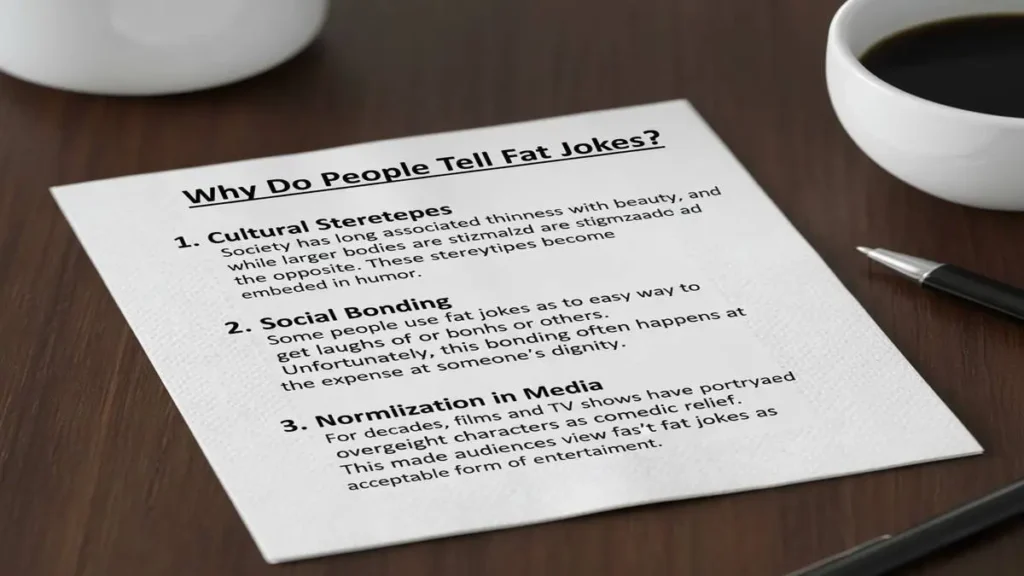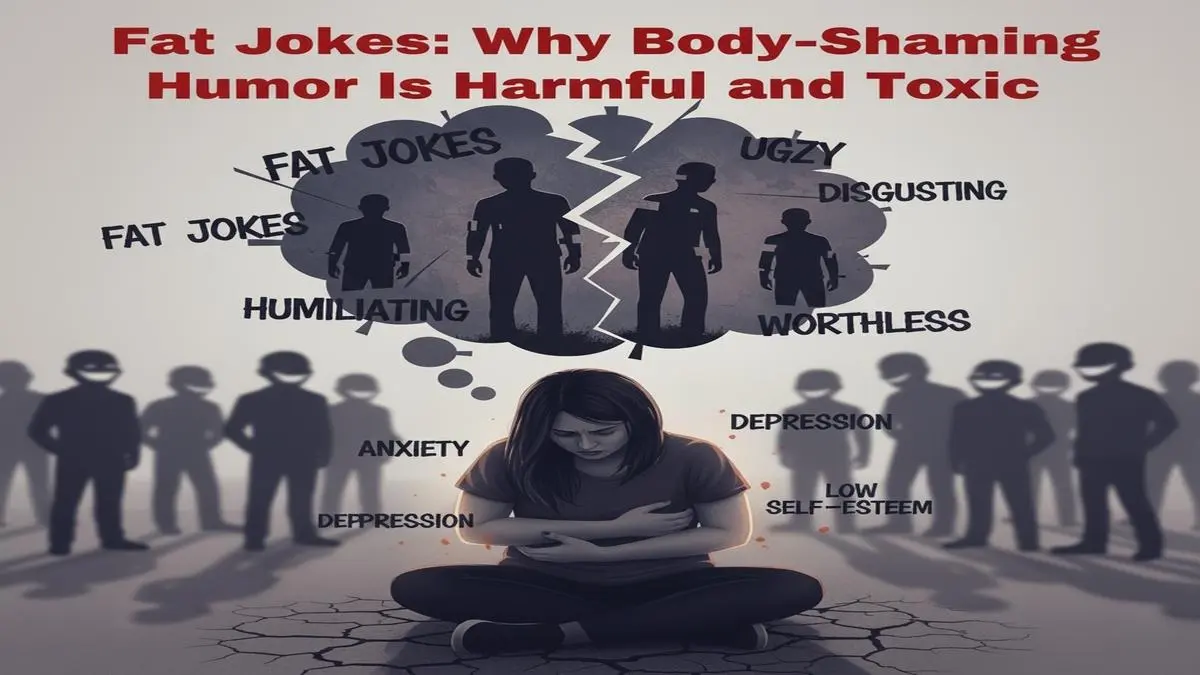Humor has long been a part of human connection, but not all jokes are created equal. Among the most damaging forms of humor are fat jokes, which target individuals based on their body size or weight. At first glance, some may dismiss them as “just jokes,” but a deeper look reveals that fat jokes are far from harmless. Instead, they reinforce harmful stereotypes, lower self-esteem, encourage bullying, and perpetuate a culture of body-shaming and discrimination.
Table of Contents
What Are Fat Jokes?
Fat jokes are comments or comedic expressions that ridicule a person’s weight or appearance. They typically exaggerate negative stereotypes, such as suggesting that overweight individuals are always eating, are less intelligent, or lack self-control. Common formats include:
- Comparing body size to objects or animals.
- Jokes about eating habits.
- Mocking physical limitations.
- Using weight as the punchline without any other context.
Although often dismissed as “harmless fun,” fat jokes reflect and reinforce broader social biases about body size.
READ ALSO: Jojoy Minecraft Download: Free Mods, Skins, and Resources
When Does a Fat Joke Cross the Line?
A fat joke crosses the line when it stops being lighthearted and instead reinforces harmful stereotypes, embarrasses someone publicly, or damages their self-esteem. Humor should uplift and connect, not single out a person’s body size as a source of ridicule. What may feel like harmless fun to the person telling the joke often carries hidden consequences for the person hearing it, especially when repeated over time.
Fat jokes cross the line when they:
- Target an individual directly: Making someone the butt of the joke about their body.
- Reinforce negative stereotypes: Portraying overweight people as lazy, unhealthy, or undisciplined.
- Causes visible discomfort: When the person laughs, looks embarrassed, upset, or hurt.
Why Fat Jokes Are So Common
It remains common in everyday conversation, media, and comedy because they are deeply rooted in cultural stereotypes and social conditioning. For decades, larger bodies have been portrayed as symbols of laziness or lack of control, making them easy targets for humor. Many people also underestimate the harm these jokes cause, viewing them as harmless or “just part of comedy,” even though they reinforce stigma and discrimination.
How Comedy Is Changing
Comedy is shifting away from stereotypes and body-shaming toward inclusivity and creativity. Audiences today value humor that connects rather than divides, focusing on shared experiences, clever storytelling, and satire of power structures. Instead of “punching down,” comedians are embracing empathy-driven humor, proving that laughter can be both entertaining and respectful in a changing cultural landscape.
Why Do People Tell Fat Jokes?

The Power of Self-Deprecation
- Builds relatability: Audiences connect more with someone who doesn’t take themselves too seriously.
- Defuses tension: Light self-mockery can make uncomfortable situations easier to navigate.
- Shows humility: Demonstrates confidence and authenticity without arrogance.
- Invites empathy: Encourages others to feel comfortable and accepted.
- Strengthens credibility: Acknowledging flaws can make messages more persuasive and genuine
How Fat Jokes Affect Health
Fat jokes may appear harmless, but they can deeply impact both mental and physical health. Constant exposure to weight-based humor reinforces stigma, leading to emotional distress, unhealthy coping behaviors, and avoidance of health-promoting activities. Instead of motivating change, fat jokes often worsen overall well-being.
Key health effects include:
- Mental health struggles: Increased risk of anxiety, depression, and low self-esteem.
- Emotional distress: Feelings of shame, humiliation, and isolation after repeated mockery.
- Unhealthy coping behaviors: Emotional eating, social withdrawal, or avoidance of physical activity.
- Disordered eating: Higher likelihood of binge eating or restrictive patterns linked to body shame.
FAQs
Q1: Are fat jokes ever harmless?
Even if meant playfully, it often reinforces stereotypes and can cause harm. What feels harmless to one person may deeply hurt another.
Q2: Do fat jokes encourage weight loss?
No. Research shows ridicule and shaming make people less likely to pursue healthy habits. Encouragement and support are far more effective.
Q3: Why are fat jokes so common in the media?
They’ve been historically used as easy punchlines, but this trend is declining as society becomes more aware of body positivity and inclusivity.
Final Thought
Fat jokes are often dismissed as lighthearted humor, but their consequences are anything but trivial. They reinforce harmful stereotypes, damage mental health, and contribute to a culture of body-shaming and exclusion. True humor should bring people together, not tear them down. By moving away from jokes that target body size and embracing humor rooted in creativity, empathy, and shared experiences, we can create a more respectful and inclusive society, one where laughter uplifts rather than harms.


